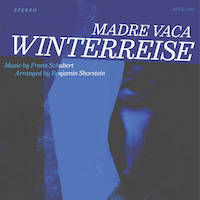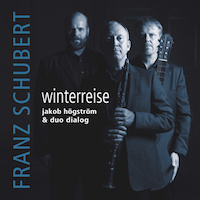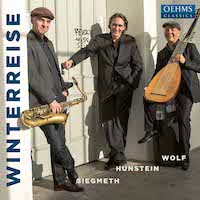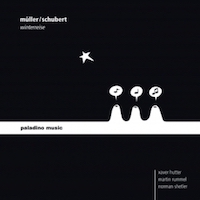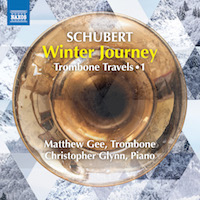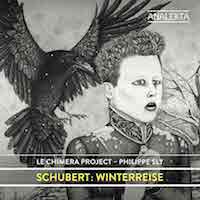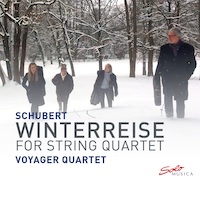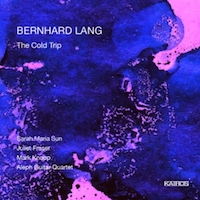(Dis)Arrangements 12: Winterreisen
|
Grant Chu Covell [January 2021.]
Franz SCHUBERT: Winterreise (1827; arr. B. SHORSTEIN, 2019). Madre Vaca: Juan Rollan (sax), Steve Strawley (tpt), Lance Reed (trb), Jonah Pierre (pno), Jarrett Carter (guit), Mike Perez (cbs), Benjamin Shorstein (drums), Milan Algood (perc). Madre Vaca Records MVR-006 (1 CD) (www.madrevaca.org). It’s just ten tracks, but this jazz octet cuts right to the heart of Winterreise sooner and more surely than most. Shorstein takes smart liberties with tempos, finding new angles for Schubert’s material. Good Night (Gute Nacht) makes sense with a stomping bass. Frozen (Erstarrung) has solos, but most of the selections sound through composed. Loneliness (Einsamkeit) works as a samba; Cuban touches reappear in The Stormy Morning (Der stürmische Morgen). The Sun Dogs (Die Nebensonnen) includes the sung text (in German) taken as a slow anthem with piano. For completeness, these are the ten songs: Goodnight (Gute Nacht), The Weathervane (Die Wetterfahne), Frozen (Erstarrung), Loneliness (Einsamkeit), The Grey Head (Der greise Kopf), The Crow (Die Krähe), Last Hope (Letze Hoffning), The Stormy Morning (Der stürmische Morgen), The Sun Dogs (Die Nebensonnen), The Hurdy Gurdy Man (Der Leiermann).
Franz SCHUBERT: Winterreise (1827; arr. D. LARSSON, M. GRONLUND, 2014). Jakob Högström (ten), Duo Dialog: Dan Larsson (clar), Magnus Gronlund (guit). dB Productions Sweden DBCD163 (1 CD) (www.db-productions.se). Voice supported with clarinet and guitar is a fetching combination, and Högström deftly confronts the cycle’s challenges. A faithful rendition, the guitar takes much of the accompaniment, the clarinet appears sparsely but effectively. In Auf dem Flusse the guitar accompanies Högström alone, and then in Rückblick, the clarinet enters as a lonely outsider. In Im Dorfe the bass clarinet expectably delivers the gentle snoring. Listening to the forsaken Das Wirsthaus, we may well wonder if Schubert had a guitar in mind.
Franz SCHUBERT: Winterreise (1827; arr. A. WOLF, H. SIEGMETH, 2019). Stefan Hunstein (narrator), Hugo Siegmeth (s-sax, t-sax, blcar), Axel Wolf (lute, theorbo). Oehms Classics OC 1898 (1 CD) (www.oehmsclassics.de). Strictly speaking, this is not an arrangement, but a Müller recitation with musical accompaniment. Schubert appears fleetingly, and the saxophone and lute/theorbo wander, improvising, remembering, reacting real-time to Hunstein’s mostly dignified reading (Im Dorfe includes barking and growling). Fittingly, there is no music for Einsamkeit. Siegmeth and Wolf have worked together before which empowers their delicate informality. Lute and sax make no attempt at completeness; look to the narration for filling gaps. Feathery theorbo and assertive saxophone are evenly balanced.
Franz SCHUBERT: Winterreise (1827; arr. M. RUMMEL, 2008). Xaver Hutter (narrator), Martin Rummel (vlc), Norman Shetler (pno). Paladino pmr 0018 (2 CDs) (www.paladino.at). Along with the bumps and scratches we expect from a live performance (July 30, 2008), a narrator delivers each Müller text before a cello-piano duo plays the corresponding song (excepting a tiny overlap in Der Leiermann). Performing what Schubert wrote for tenor, Rummel inclines towards expression rather than precision, and the melodies become phrased and accented differently as the cellist wanders in the cold. Perhaps it’s the alternating text and music, but this version put me in the mood for a standard Winter Journey. Perhaps also because this version runs long (45:56 + 37:22).
“Trombone Travels, Vol. 1.” Franz SCHUBERT: Winter Journey (1827; arr. M. GEE, 2018). Matthew Gee (trb), Christopher Glynn (pno). Naxos 8.574093 (1 CD) (www.naxos.com). The low brass have great expressive potential. In particular, the trombone with its wide range, portamento and choice of mutes can access many timbres. Gee thinks intentionally about articulation, reflecting Müller’s words as well as crafting a convincing melody. Mutes enable two voices in Frülingstraum and Im Dorfe, and intimacy in Letzte Hoffnung and Die Nebensonnen. This is a promising start to a planned series. Mahler next?
Franz SCHUBERT: Winterreise (1827; arr. F. DE L’ÉTOILE, S. CARRIER, 2017). Le Chimera Project: Philippe Sly (b-bar, hurdy-gurdy), Félix de l’Étoile (clar), Karine Gordon (trb), Samuel Carrier (accordion, pno), Jonathan Millette (vln). Analekta AN 2 9138 (1 CD) (www.analekta.com). This reinterpretation maintains Winterreise’s vocal line (with a capable bass baritone), but revisits the accompaniment variably employing clarinet, trombone, accordion, violin and piano, with yes, hurdy-gurdy towards the end. Infusing their retelling with aspects of Klezmer and Roma, de l’Étoile and Carrier’s idea was to rebuild the cycle with instruments and players from outside the lieder tradition. Roy Rallo directed the first live performances in 2018. Schubert and Müller are never abandoned, and because the vocal line is familiar, the accompaniment gains strength through its simplicity, sometimes just a single plucking violin or trombone. Gute Nacht appears twice: Without voice at the start and lengthened at the end as a lonely apotheosis.
“Schubert Winterreise for String Quartet.” Franz SCHUBERT: Winterreise (1827; arr. A. HÖRICHT, 2019). Voyager Quartet: Nico Christians, Maria Krebs (vln), Andreas Höricht (vla), Klaus Kämper (vlc). Solo Musica SM 335 (1 CD) (www.solo-musica.de). A string quartet realization isn’t far-fetched, after all Schubert did write many fine quartets himself. However, this exploration wraps just half the songs (Nos. 1, 3, 5, 7, 9, 11, 12, 20, 21, 22, 23 and 24) in dissonant, meandering intermezzos. Nothing is wrong with stylistic freedom, except that the Shostakovich-infused angst doesn’t contribute, and more crucially, the Voyagers sound as if they are arguing with Schubert. The Schubert transcriptions themselves are muddled: Mid-phrase the foursome will switch between melody and accompaniment. If this variability were the intention, the Voyagers don’t seem convinced. Eventually a game sets in: When will Schubert dissolve? Which song might appear?
“The Cold Trip.” Bernhard LANG: Monadologie XXXII: The Cold Trip, Part 1 (2014)1; Monadologie XXXII: The Cold Trip, Part 2 (2014-15)2. Sarah Maria Sun1 (sop), Aleph Guitar Quartet1: Andrés Hernández Alba, Tillmann Reinbeck, Wolfgang Sehringer, Christian Wernicke (guit), Juliet Fraser2 (voice), Mark Knoop2 (piano, laptop). Kairos Music 0015018KAI (2 CDs) (www.kairos-music.com). Familiarity with Lang’s aesthetic may lessen the shock as he loops distorted snippets from established works under a banner of homage and reconstruction. The Cold Trip reflects the original’s two-part publication. The first dozen require a nimble high soprano and four differently tuned guitars. The second half uses voice, piano and laptop, and adds a Prologue and Epilogue. The text is in English (hence the title), and the rescoring atomizes Schubert. Part 1’s colorful quintet is a creepy update, a phonograph needle skipping across a scratchy record. The microtonal intro to Looking Back (Rückblick) is clever. Because the second half employs laptop samples in addition to voice and piano, Schober’s rooms are pushed even further away. Failure to recognize the original is a definite possibility, as is becoming increasingly frustrated with the whole shebang. Visiting this again after a few years, I’m struck by how Lang flirts with the nature of memory. Imagine trying to reconstruct Winterreise while a band is playing in a downtown club.
A Wolf, B Lang, Carrier, de l’Étoile, Gee, Gronlund, Höricht, Larsson, Rummel, Schubert, Shorstein, Siegmeth
[More (Dis)Arrangements, Grant Chu Covell]
[More
A Wolf, B Lang, Carrier, de l’Étoile, Gee, Gronlund, Höricht, Larsson, Rummel, Schubert, Shorstein, Siegmeth]
[Previous Article:
Piano Factory 27.]
[Next Article:
Used Bin Troll Tweets VV.]
|
